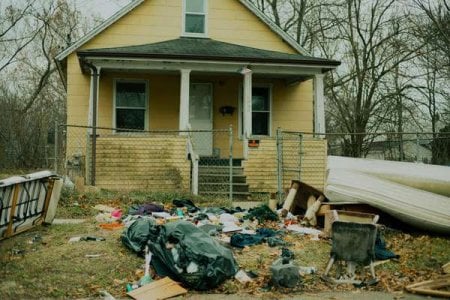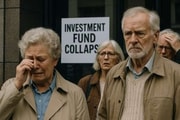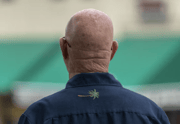Are bad tenants wrecking your community? The push for tougher penalties you need to know about
- Replies 10
Social housing is meant to be a lifeline—a safe, affordable place for those who need it most.
But what happens when a few bad apples spoil the bunch, leaving homes in ruins and communities in distress?
That’s the question on everyone’s lips in South Australia, where calls are growing louder for stricter penalties against tenants who deliberately trash their public housing.
The latest flashpoint comes from Paradise, a suburb where a housing trust property was left in a shocking state.
Photos from the scene tell a grim story: a collapsed ceiling, smashed windows, and a backyard overflowing with rubbish. The stench of urine reportedly lingered in the air, much to the dismay of neighbours who had been raising concerns for months.

'It smells like urine in here,' one local resident lamented, highlighting the impact not just on the property, but on the entire neighbourhood.
This isn’t just about one house. The issue is part of a much bigger problem. As of April 30, more than 15,000 South Australians are waiting for public housing, with nearly 4,000 in the most urgent 'Category 1' group.
Also read: Second chances start here: Couple transforms historic home for women in need
Meanwhile, over 1,400 public housing properties sit empty, many needing repairs or complete redevelopment before they can be lived in again.
It’s a vicious cycle: when homes are trashed, they’re taken out of circulation, making the wait even longer for those in desperate need.
The South Australian opposition is now demanding action. Their message is clear: tenants who deliberately damage public housing should not be re-housed until they’ve paid for the repairs.
'We don’t want to see people trash these community state government assets rewarded when there are so many people at the moment sleeping rough,' said Opposition Leader Vincent Tarzia.
It’s a sentiment echoed by many in the community, who feel frustrated watching valuable homes go to waste while thousands remain homeless.
The government insists it’s not turning a blind eye. Housing Minister Nick Champion says they’re cracking down on antisocial behaviour, with a 'three written warnings' policy and more cases being taken to the tribunal than ever before.
'We are cracking down on antisocial behaviour,' Champion said. 'We’ve adopted a three written warnings policy, we’re taking more matters to the tribunal than ever before.'
Latest update on social housing from NSW. Source: ABC News (Australia) / Youtube.
While many support tougher penalties, there’s also concern for what happens to tenants after eviction.
In the Paradise case, the tenant was evicted after the house was boarded up and bailiffs arrived. Neighbours expressed mixed feelings—relief that the property might finally be restored, but also worry for the former tenant’s welfare.
'I’m glad she’s gone, but on the other hand I do worry—does she have somewhere to live?' said David, a local resident.
You can view the original photos here.
Read more: Queensland government announces more than half a billion dollars for homeless services

Have you seen similar issues in your community? Do you think the government should get tougher on tenants who damage public housing, or is there a better way to balance compassion with accountability? Share your thoughts in the comments below!
But what happens when a few bad apples spoil the bunch, leaving homes in ruins and communities in distress?
That’s the question on everyone’s lips in South Australia, where calls are growing louder for stricter penalties against tenants who deliberately trash their public housing.
The latest flashpoint comes from Paradise, a suburb where a housing trust property was left in a shocking state.
Photos from the scene tell a grim story: a collapsed ceiling, smashed windows, and a backyard overflowing with rubbish. The stench of urine reportedly lingered in the air, much to the dismay of neighbours who had been raising concerns for months.

The South Australian opposition is calling for stricter penalties for public housing tenants who deliberately damage their homes, saying they shouldn’t be re-housed until repair costs are repaid. Image source: Bruno Guerrero / Unsplash. Disclaimer: This is a stock image used for illustrative purposes only and does not depict the actual person, item, or event described.
'It smells like urine in here,' one local resident lamented, highlighting the impact not just on the property, but on the entire neighbourhood.
This isn’t just about one house. The issue is part of a much bigger problem. As of April 30, more than 15,000 South Australians are waiting for public housing, with nearly 4,000 in the most urgent 'Category 1' group.
Also read: Second chances start here: Couple transforms historic home for women in need
Meanwhile, over 1,400 public housing properties sit empty, many needing repairs or complete redevelopment before they can be lived in again.
It’s a vicious cycle: when homes are trashed, they’re taken out of circulation, making the wait even longer for those in desperate need.
The South Australian opposition is now demanding action. Their message is clear: tenants who deliberately damage public housing should not be re-housed until they’ve paid for the repairs.
'We don’t want to see people trash these community state government assets rewarded when there are so many people at the moment sleeping rough,' said Opposition Leader Vincent Tarzia.
It’s a sentiment echoed by many in the community, who feel frustrated watching valuable homes go to waste while thousands remain homeless.
The government insists it’s not turning a blind eye. Housing Minister Nick Champion says they’re cracking down on antisocial behaviour, with a 'three written warnings' policy and more cases being taken to the tribunal than ever before.
'We are cracking down on antisocial behaviour,' Champion said. 'We’ve adopted a three written warnings policy, we’re taking more matters to the tribunal than ever before.'
Latest update on social housing from NSW. Source: ABC News (Australia) / Youtube.
While many support tougher penalties, there’s also concern for what happens to tenants after eviction.
In the Paradise case, the tenant was evicted after the house was boarded up and bailiffs arrived. Neighbours expressed mixed feelings—relief that the property might finally be restored, but also worry for the former tenant’s welfare.
'I’m glad she’s gone, but on the other hand I do worry—does she have somewhere to live?' said David, a local resident.
You can view the original photos here.
Read more: Queensland government announces more than half a billion dollars for homeless services
Key Takeaways
- The South Australian opposition is calling for stricter penalties for public housing tenants who deliberately damage their homes, saying they shouldn’t be re-housed until repair costs are repaid.
- Images of a trashed Paradise housing trust property have sparked outrage, showing extensive damage and sparking concern for thousands of South Australians still waiting for public housing.
- Data reveals over 15,000 South Australians are on the public housing waitlist, while more than 1400 public housing properties remain vacant and in need of repairs or redevelopment.
- The government says it’s cracking down on antisocial behaviour, using a three written warnings policy and taking more cases to the tribunal to address misconduct in public housing.
Have you seen similar issues in your community? Do you think the government should get tougher on tenants who damage public housing, or is there a better way to balance compassion with accountability? Share your thoughts in the comments below!







